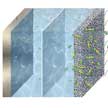
One of the bottlenecks in widespread implementation of sustainable energy technologies are highly efficient energy storage systems. Lithium-ion batteries (LIBs) are the prevailing solution for today’s electronic devices, from consumer gadgets to medical devices, electric vehicles, even satellites. The main reason for the domination of LIB technology in many application areas is that it has the highest electrical storage capacity with respect to its weight.
LIBs generally contain an energy capacity of 100–200 Wh/kg. This allows most electric cars to travel upwards of 300-400 kilometers on a single change. However, despite the high energy density of LIBs compared to other kinds of batteries, they are still around a hundred times less energy dense than gasoline (which contains 12700 Wh/kg by mass or 8760 Wh/L by volume). That means that gasoline-powered engines are gaining higher thermal efficiencies, allowing for fuel efficiencies upwards of 6-7 L/100km. On a 60-liter tank, this allows for more than 800-1000 km of range, easily doubling, or even tripling that of the average electric car.
Although LIBs are continuing to achieve higher energy densities, various research studies are indicating that max theoretical energy limits (estimated at 400-500 Wh/kg) are in sight.
